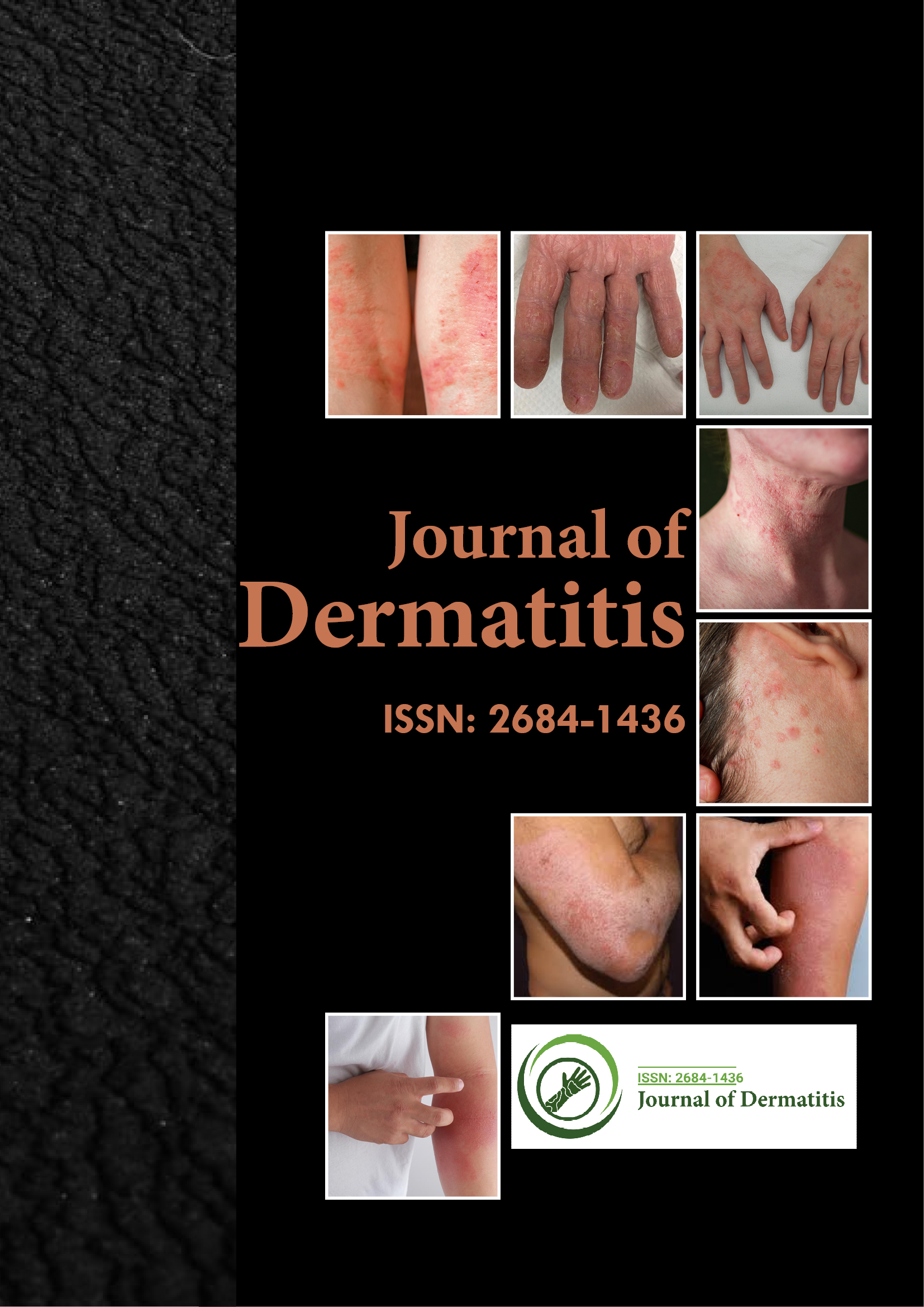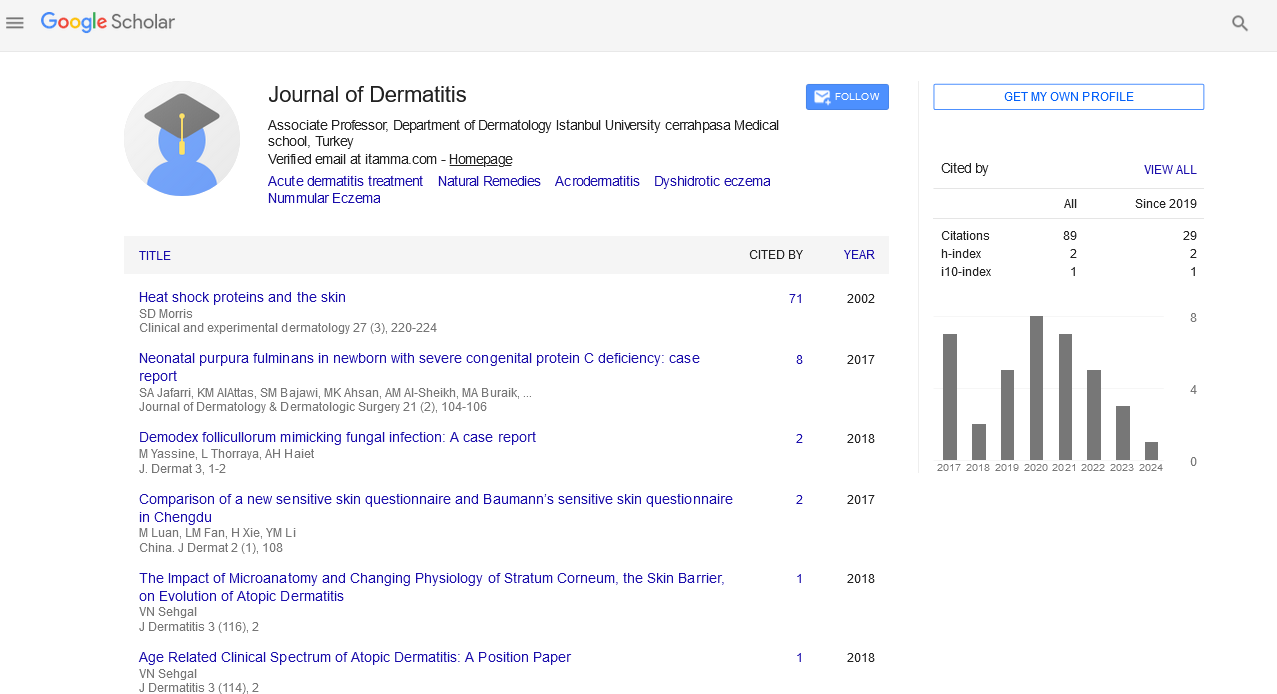Indexed In
- RefSeek
- Hamdard University
- EBSCO A-Z
- Euro Pub
- Google Scholar
Useful Links
Share This Page
Journal Flyer

Open Access Journals
- Agri and Aquaculture
- Biochemistry
- Bioinformatics & Systems Biology
- Business & Management
- Chemistry
- Clinical Sciences
- Engineering
- Food & Nutrition
- General Science
- Genetics & Molecular Biology
- Immunology & Microbiology
- Medical Sciences
- Neuroscience & Psychology
- Nursing & Health Care
- Pharmaceutical Sciences
Perspective - (2022) Volume 7, Issue 2
Differences between Baby Eczema and Dry Skin
Merad Yassine*Received: 01-Mar-2022, Manuscript No. JOD-22-16436; Editor assigned: 04-Mar-2022, Pre QC No. JOD-22-16436 (PQ); Reviewed: 17-Mar-2022, QC No. JOD-22-16436; Revised: 24-Mar-2022, Manuscript No. JOD-22-16436 (R); Published: 31-Mar-2022, DOI: 10.35248/2684.1436.22.7.147
Description
Atopic Dermatitis (AD) is another name for eczema. It is a skin condition that is often seen in babies. Symptoms include dry, inflamed, itchy skin. AD can be a lifelong condition. It affects up to 25% of children and up to 60% of people experience it in the first year of life. Most babies go beyond this condition, but 10-30% of reliable sources continue to have symptoms until adulthood [1].
Symptoms tend to be debilitating. When symptoms relapse or worsen, it is called flare-up. Dermatologists usually treat flare-ups with topical corticosteroid creams and ointments. To reduce the frequency of flare-ups, caregivers need to be aware of potential triggers and irritants that can aggravate the baby's skin [2].
Causes
Researchers do not know exactly what causes the baby's eczema, but believe that it is most likely due to a combination of genetic and environmental factors. Eczema is not contagious. Infants are more likely to develop eczema if their family has eczema, hay fever, or asthma. These conditions do not cause each other, but if the baby already has a baby's eczema, the baby is more likely to develop hay fever or asthma. Scientists believe that eczema is caused by a malfunction of the immune system. This impairs the skin's barrier and ability to retain water [3].
Eczema is a general term used to describe the extent of inflammatory skin disorders. In addition to atopic dermatitis, other types of eczema that generally affect children include contact dermatitis, dyshidrotic eczema.
Differences between baby eczema and dry skin
Dry skin is a symptom of eczema. Pediatricians can diagnose eczema by examining the baby's skin. If the symptoms are severe, she may be referred to a pediatric dermatologist for confirmation and treatment. In general, dry skin can be treated with moisturizers at home and is not as troublesome as eczema [4].
However, hydration is even more important for babies with darker skin, as they tend to be drier than babies with lighter skin.
Treatment
There is no cure for baby's eczema, but the condition usually becomes less serious over time. Treatment focuses on treating dry skin, preventing relapses and reducing skin inflammation. Doctors recommend the following strategies for parents whose babies have eczema.
• Don’t give your baby a long, hot bath (use cold or lukewarm water instead), and avoid rubbing your baby's skin hard, especially with a rough washcloth, loofah or towel.
• Consider a bleach bath diluted twice a week. This is useful for babies over 3 months who often get eczema. Discuss this with your doctor.
• Regularly moisturize your baby's skin with fragrance-free, dyefree ointments, creams and lotions, especially immediately after bathing.
• Put on soft cotton clothing those breaths for your baby.
• Avoid using scented products.
• Shorten your baby's fingernails to avoid scratches that can damage the skin and cause irritation and infection.
• Eliminate irritants and known allergens from your home as much as possible.
• Keep your baby cool to avoid excessive sweating, perhaps with a cool compress (wet, cool washcloth), especially in inflamed areas.
Natural remedies for baby eczema
• If you need some extra help soothing baby`s skin, these natural eczema treatments may make things better.
• Wet a washcloth. Drape cool, wet washcloths or gauze over your baby`s irritated skin for five to ten minutes at a time or however long you can get your squirmy worm to cooperate.
• Try an oatmeal bath. Sprinkle a bit of uncooked oatmeal, colloidal oatmeal (made specifically for baths) or even baking soda into the tub when you wash your baby.
• Everything can naturally relieve eczema and inflammation. Fight the dry air. Running a Cool mist humidifier in your baby's bedroom will help keep your skin hydrated.
• Clean regularly to prevent the growth of bacteria and mold. Layer your child. Sweating can resume the eczema cycle, which is the last thing you want.
• Layers allow your baby's clothes to adapt to warm temperatures.
Ask your pediatrician about probiotics. Studies are being conducted to find out if probiotics (powdered friendly live bacteria) help relieve eczema when added to dry baby foods and dietary supplements. Ask your doctor to weigh you before trying it [5].
Prevention for baby eczema
If your baby has contact dermatitis, you can do your best to prevent relapse by identifying and avoiding common triggers such as:
Dress your baby in light cotton clothes. Gently stroke the drool when you see it.
Scratched fabric
• In addition to clothing and carpets, baby stuffed animals can also cause neurodermatitis.
• Allergen
• Think of animal hair, pollen, and dust.
• Stimulating detergent and soap.
• Consider using delicate detergents when washing baby clothes and sheets [6].
REFERENCES
- Kurdi AT. Bullosis diabeticorum. The Lancet. 2013; 382:e31.
[Crossref], [Pubmed], [Google Scholar]
- Dinulos JG. Habif'Clinical Dermatology E-Book. Elsev Heal Sci. 2019.
[Crossref], [Pubmed], [Google Scholar]
- Jean B, Joseph LJ, Julie VS. Other Vesiculo bullous diseases. Dermatol. 2021.
[Crossref], [Google Scholar]
- Downing C, Tamirisa A, Khan F, Tyring S, Lapolla W. Bullosis diabeticorum: A rare bullous eruption in diabetes mellitus. J Am Acad Dermatol. 2014; 70:115.
[Crossref], [Pubmed], [Google Scholar]
- Parikh S, Murphy M, Chen A. A case of bullosis diabeticorum restricted to the fingers: 6756. J Am Acad Dermatol. 2018; 79:3.
[Crossref], [Google Scholar]
- Frioui M, Aouiche S, Ouerdane K, Boudiba A. P2131 << Bullose diabétique: A propos d’un cas>>. Diabetes Metab. 2013; 39:A99.
[Crossref], [Google Scholar]
Citation: Yassine M (2022) Differences between Baby Eczema and Dry Skin. J Dermatitis.7:147
Copyright: &Copy; © 2022 Yassine M. This is an open-access article distributed under the terms of the creative commons attribution license which permits unrestricted use, distribution and reproduction in any medium, provided the original author and source are credited.

